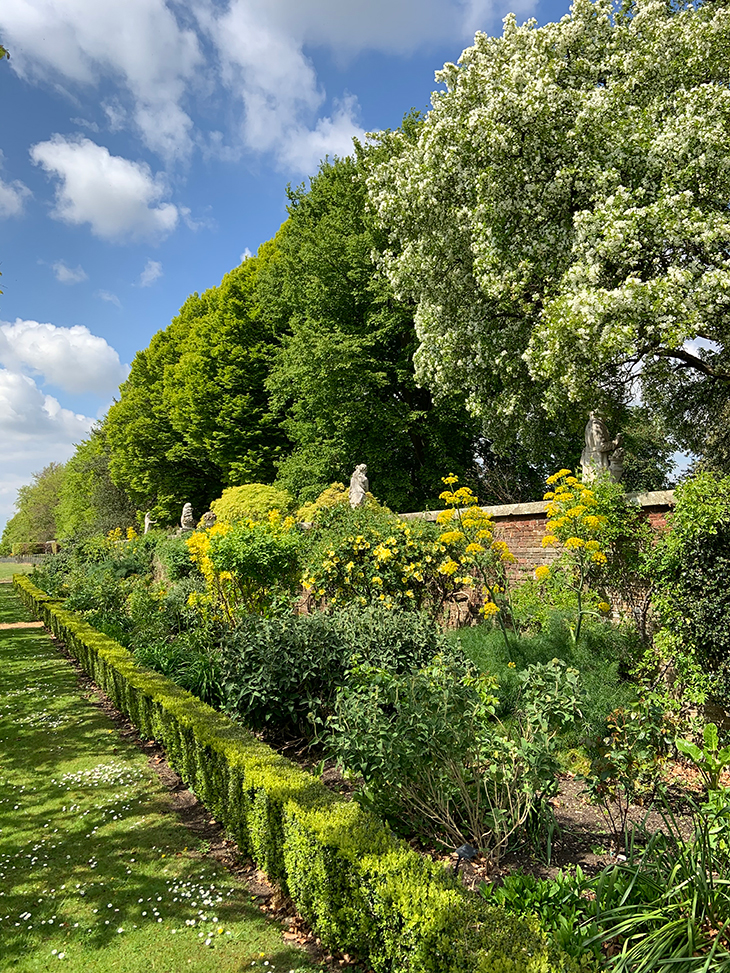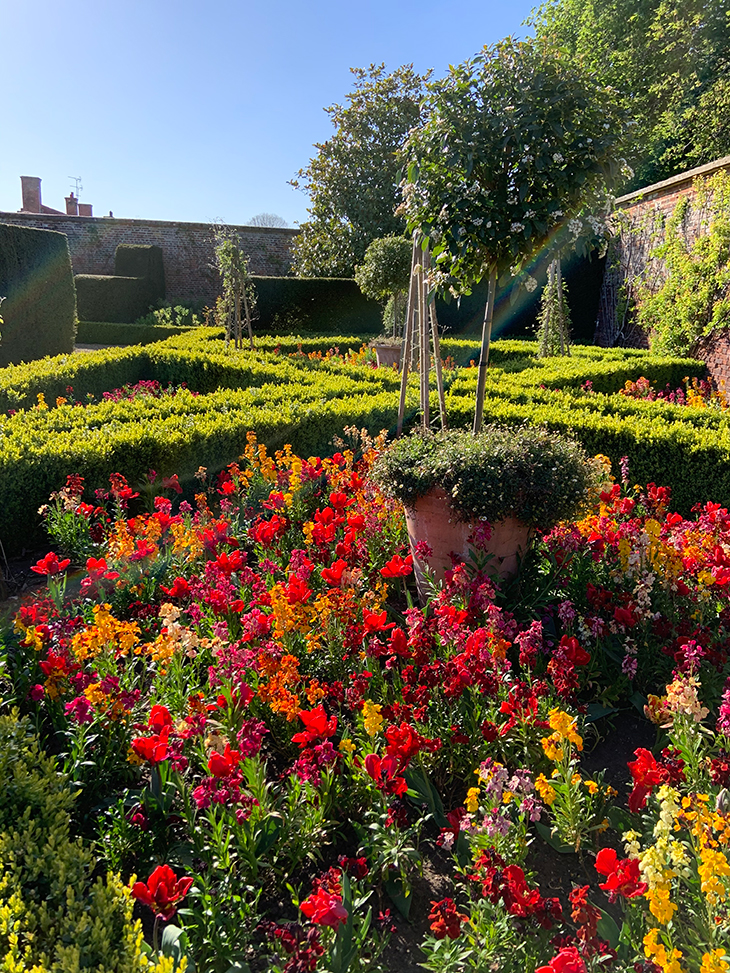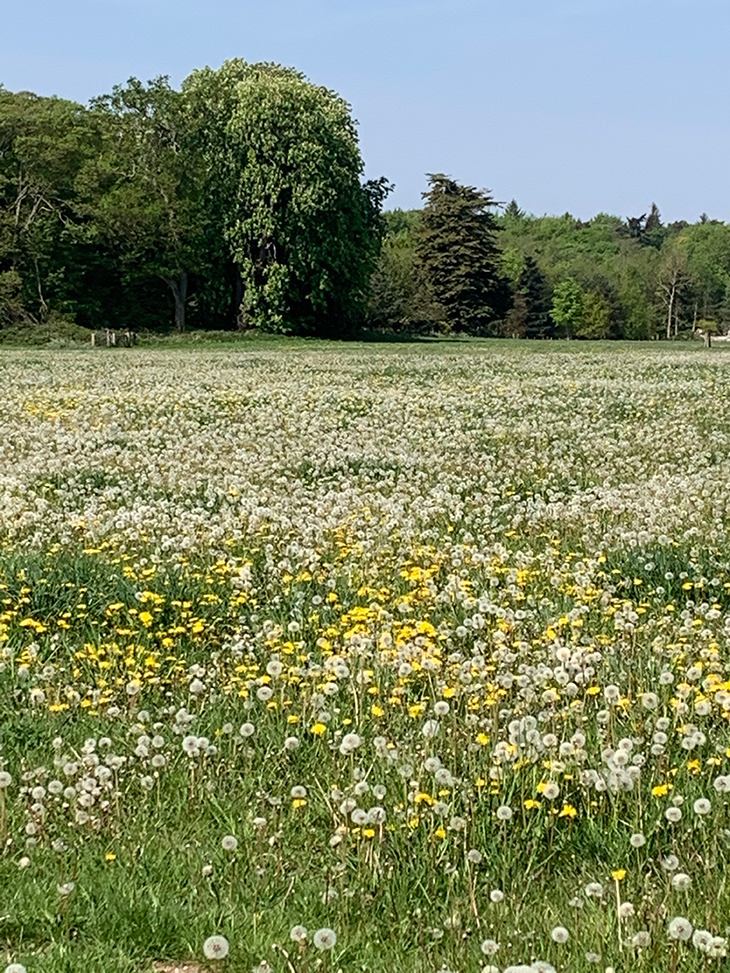We feel extraordinarily fortunate to be spending this lockdown period in the country, watching the spring unfurling around us, with May blossom and cow parsley in the hedgerows, lilacs and chestnut in flower, and the first swifts wheeling in the air. Yet any feeling of peace and contentment in our enforced isolation is of course tempered by the knowledge of what this terrible illness is doing to so many people’s lives and livelihoods, and the uncertainty of what lies ahead. And so a sense of unease hangs over us, and teaches us what our forebears took for granted: that we are on moving sands and the world can suddenly change in ways we never dreamed of.
Here at Houghton we had been ready to open a major exhibition of Anish Kapoor sculptures at the end of March: great stone and marble forms rising from the lawn in front of the house and along diagonal alleyways in the grounds; a spectacular sky mirror reflecting the clouds (and the stars at night); and an array of smaller, many-coloured mirrors replacing the antique busts in the Stone Hall.
Now we feel privileged to be able to walk around Kapoor’s majestic work entirely alone, but there is no sense of purpose without the visitors who would usually be here to share the excitement. We are praying we can open the grounds (if not the house) later in the summer, or even keep the sculptures in place until next year; the alternative of simply dismantling the show would be an unimaginable waste, and a severe blow to finances.

Courtesy David and Rose Cholmondeley
Apart from the Herculean task of installing an exhibition of this scale – following on from James Turrell in 2015, then Richard Long (2017), Damien Hirst (2018) and Henry Moore (2019) – a huge amount of work goes into preparing the house for the season and keeping the grounds in tip-top condition; trimming the pleached limes and 1,500 yards of beach hedge on the West Front, and almost constant mowing of the four great avenues and the green sward around the house.
A small part of our estate team is still able to come in to work while keeping to the strict distancing rules, so this regular maintenance can continue. It may seem absurd, like a dress rehearsal with no opening night; yet we cannot afford to let things go and hope to resume when restrictions are relaxed. In the garden, it would take many months to regain lost ground. So with only our new head gardener and his wife able to work, we have been bribing our children to help us pull up bindweed and other horrors from the herbaceous borders – a losing battle on many fronts. More satisfying tasks include picking up roadside litter and removing plastic tree-guards from young copses in the park.

Courtesy David and Rose Cholmondeley
Otherwise, the pace of life is certainly slower with an empty diary. We now have the chance to reorganise store rooms in the attics or cellars, and spend time alone in different parts of the house. Ideas occur of how a room could be improved by a change of colour, or moving around furniture and pictures. For example, we would like to replace the family portraits in the Red Saloon with a denser hang of subject paintings, as in Sir Robert Walpole’s time (and again briefly in 2013 when we borrowed back part of his collection from the Hermitage for our first exhibition, ‘Houghton Revisited’). With the wall hangings of original crimson velvet, and William Kent’s gilded side tables and magnificent painted ceiling depicting Apollo driving his chariot, the room should once again take on the character of a Roman salone, as was surely the intention.
However, such projects will have to wait; now is a time to take stock and cut costs where we can. In addition to the loss of revenue from having to close the house, all outside events have been cancelled, including our annual horse trials, and the Houghton Festival of techno music, which has been hugely successful and a great addition to our programme. Along with most other estates, there will also be a fall in income from commercial and other lettings, as well as from endowments.

Courtesy David and Rose Cholmondeley
Strangely, the focus is once again on farming, where resilience is the key to success. At Houghton, our herd of Jersey dairy cows continues to be milked twice daily before returning to lush grass; ewes are busily lambing, Longhorn cattle are calving in the park, and our herd of fallow deer has just started fawning. On the arable land, oats, barley and wheat have been drilled, silage cut and stored; potatoes, carrots, leeks and onions planted, weeded and irrigated. Pigs and chickens are growing and large areas of wild birdseed are now being drilled. In short, a hive of activity from a committed team producing organic food to the highest standards and increasing the biodiversity of the estate.
The present crisis may well bring about a sea change in the way owners and managers think about the future of their estates, with more diverse use of land and buildings, and greater innovation. Good husbandry of the soil will be crucial, as well as keeping livestock in more natural and healthy conditions. So perhaps some good may come out of these challenging times.
For more information on Houghton Hall, click here.

Home alone at Houghton – life in lockdown at one of England’s great houses
Courtesy Houghton Hall
Share
We feel extraordinarily fortunate to be spending this lockdown period in the country, watching the spring unfurling around us, with May blossom and cow parsley in the hedgerows, lilacs and chestnut in flower, and the first swifts wheeling in the air. Yet any feeling of peace and contentment in our enforced isolation is of course tempered by the knowledge of what this terrible illness is doing to so many people’s lives and livelihoods, and the uncertainty of what lies ahead. And so a sense of unease hangs over us, and teaches us what our forebears took for granted: that we are on moving sands and the world can suddenly change in ways we never dreamed of.
Here at Houghton we had been ready to open a major exhibition of Anish Kapoor sculptures at the end of March: great stone and marble forms rising from the lawn in front of the house and along diagonal alleyways in the grounds; a spectacular sky mirror reflecting the clouds (and the stars at night); and an array of smaller, many-coloured mirrors replacing the antique busts in the Stone Hall.
Now we feel privileged to be able to walk around Kapoor’s majestic work entirely alone, but there is no sense of purpose without the visitors who would usually be here to share the excitement. We are praying we can open the grounds (if not the house) later in the summer, or even keep the sculptures in place until next year; the alternative of simply dismantling the show would be an unimaginable waste, and a severe blow to finances.
Courtesy David and Rose Cholmondeley
Apart from the Herculean task of installing an exhibition of this scale – following on from James Turrell in 2015, then Richard Long (2017), Damien Hirst (2018) and Henry Moore (2019) – a huge amount of work goes into preparing the house for the season and keeping the grounds in tip-top condition; trimming the pleached limes and 1,500 yards of beach hedge on the West Front, and almost constant mowing of the four great avenues and the green sward around the house.
A small part of our estate team is still able to come in to work while keeping to the strict distancing rules, so this regular maintenance can continue. It may seem absurd, like a dress rehearsal with no opening night; yet we cannot afford to let things go and hope to resume when restrictions are relaxed. In the garden, it would take many months to regain lost ground. So with only our new head gardener and his wife able to work, we have been bribing our children to help us pull up bindweed and other horrors from the herbaceous borders – a losing battle on many fronts. More satisfying tasks include picking up roadside litter and removing plastic tree-guards from young copses in the park.
Courtesy David and Rose Cholmondeley
Otherwise, the pace of life is certainly slower with an empty diary. We now have the chance to reorganise store rooms in the attics or cellars, and spend time alone in different parts of the house. Ideas occur of how a room could be improved by a change of colour, or moving around furniture and pictures. For example, we would like to replace the family portraits in the Red Saloon with a denser hang of subject paintings, as in Sir Robert Walpole’s time (and again briefly in 2013 when we borrowed back part of his collection from the Hermitage for our first exhibition, ‘Houghton Revisited’). With the wall hangings of original crimson velvet, and William Kent’s gilded side tables and magnificent painted ceiling depicting Apollo driving his chariot, the room should once again take on the character of a Roman salone, as was surely the intention.
However, such projects will have to wait; now is a time to take stock and cut costs where we can. In addition to the loss of revenue from having to close the house, all outside events have been cancelled, including our annual horse trials, and the Houghton Festival of techno music, which has been hugely successful and a great addition to our programme. Along with most other estates, there will also be a fall in income from commercial and other lettings, as well as from endowments.
Courtesy David and Rose Cholmondeley
Strangely, the focus is once again on farming, where resilience is the key to success. At Houghton, our herd of Jersey dairy cows continues to be milked twice daily before returning to lush grass; ewes are busily lambing, Longhorn cattle are calving in the park, and our herd of fallow deer has just started fawning. On the arable land, oats, barley and wheat have been drilled, silage cut and stored; potatoes, carrots, leeks and onions planted, weeded and irrigated. Pigs and chickens are growing and large areas of wild birdseed are now being drilled. In short, a hive of activity from a committed team producing organic food to the highest standards and increasing the biodiversity of the estate.
The present crisis may well bring about a sea change in the way owners and managers think about the future of their estates, with more diverse use of land and buildings, and greater innovation. Good husbandry of the soil will be crucial, as well as keeping livestock in more natural and healthy conditions. So perhaps some good may come out of these challenging times.
For more information on Houghton Hall, click here.
Unlimited access from just $16 every 3 months
Subscribe to get unlimited and exclusive access to the top art stories, interviews and exhibition reviews.
Share
Recommended for you
Shetland cattle and sparkling sculptures – on Yorkshire Sculpture Park in lockdown
The director of programme at YSP outlines the unique challenges – and consolations – of shuttering the site
Can reconstructing historic collections give us the wrong idea about the past?
Reuniting objects that belonged to important collectors can be a visual treat, but there are some intellectual traps to be avoided
Keeping it real – neorealism in the Netherlands
Museum MORE has done a great deal to invigorate a genre once seen as hopelessly old-fashioned